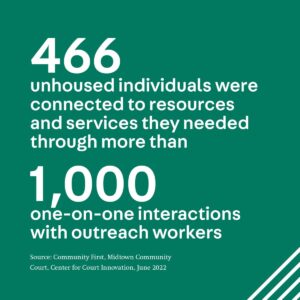Whether working with clients in a court-based setting, with people after release from incarceration, or before they ever come into contact with the justice system, our approach to mental wellness focuses on identifying the individual needs of each person while addressing the many factors that can contribute to justice system involvement, including mental illness, housing and food insecurity, unmet healthcare needs, and lack of employment.
At the Center for Court Innovation, we have increasingly focused on reaching people “upstream,” long before they ever enter the justice system. We take a multi-disciplinary approach and work towards building bridges—between government, community-based organizations, and the communities at the center of our work.
Here are three examples of that work.
1. In the Times Square area, Community First is a unique approach to meet the needs of people who are unhoused. The program is built on partnerships with mental health service provider Fountain House, housing organization Breaking Ground, and economic improvement group Times Square Alliance. Unlike traditional street outreach, team members meet people where they are at. Through listening and distributing necessities, like blankets and food, we build relationships over time so that when people are ready for support, we are a trusted source to link people to longer-term housing and services.
2. To respond to the lack of access to services during the height of the COVID-19 pandemic, our team in Newark, N.J., coordinated pop-up events where residents could obtain essential services in a safe, open, and welcoming space. Over the course of the outreach, more than 20 local organizations—representing legal, health, and social services—were available to speak to community members and provide services and resources to attendees. People with previous experience navigating these systems spread the word about these events, ensuring those most in need were able to receive support.
3. Our team in Upstate New York works with mental health service providers to support crisis intervention team trainings for law enforcement so they have a better understanding of mental health issues, community resources, and techniques for de-escalating conflict. The ultimate goal is to improve outcomes for everyone by helping people who need it get treatment rather than jail.
A principle running through all our work is partnership and coordinated action. Only by breaking down silos among government, community-based organizations, and the community itself can we shrink the harms of the criminal legal system while increasing health and safety and providing support for those who need it most.
